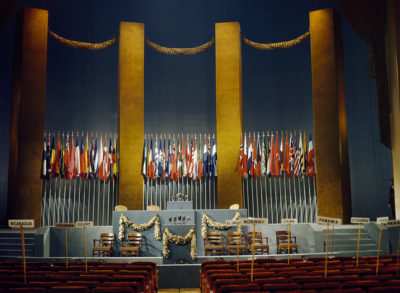Bringing it up to date: 100 years on from the First World War
ForcesWatch comment
This article, summarising ForcesWatch work, was first published on the White Feather Diaries website.
ForcesWatch is a research and campaigning organisation which challenges military recruitment practices in the UK that are not in the best interests of young people. They are currently working on raising the age of recruitment to 18, in partnership with Child Soldiers International, and challenging the growing presence of the military in the education system, along with Quakers in Britain.
Emma Sangster from ForcesWatch discusses their work.
It is hard to believe that 100 years after a quarter of a million boy soldiers signed up to fight in the First World War that we are still working to ensure that vulnerable youngsters are not seduced into enlisting. ForcesWatch research has looked at how, from almost every aspect, the best interests of 16 and 17 year old recruits are not served well by this policy, despite the prevalent narrative that the armed forces provide a valuable route out of disadvantage.
The UK is the only country in the EU to still recruit into the armed forces at 16. This is despite being a signatory to the UN Convention on the Rights of the Child and the Optional Protocol on the Involvement of Children in Armed Conflict. However, public opinion is definitely on the side of children’s rights and we believe it is only a matter of time before this anachronistic policy changes.
Military engagement with young people
The military are keen to ‘engage’ with young people in as many ways as they can, not only for recruitment, but also to create a ‘positive awareness’ about the armed forces amongst the next generation. The advance of social media has opened up new avenues for them as have the Armed Forces Day and other annual celebrations and commemorations around the armed forces.
Of particular concern is the array of military-related initiatives in education, including the Department for Education’s promotion of ‘military ethos’ in schools. The plan to expand cadet forces into more secondary schools and military-themed activities as ‘alternative provision’ for those at risk of failing are also a concern. The armed forces are becoming more involved in partnering education institutions, particularly the University Technical Colleges (UTCs). UTCs provide employment-focused curriculum for 14–18 year olds. Currently, about half of these colleges have links to either the military or the defence industry, sometimes both.
Although there are many good peace-related initiatives that schools are embracing, education for and about peace is not part of the structured curriculum, despite recommendations from the United Nations Committee on the Rights of the Child. The balance is very much in favour of promoting the military.
Militarism in society
ForcesWatch also responds to the promotion of militarist values in civil society. This promotion is intended to generate support for the armed forces and militarised approaches to conflict. Over recent years, militarism has crept into everyday life in a way that is prioritising the needs and interests of military institutions.
As well as targeting the next generation of policy makers, voters and recruits in schools, colleges and universities, the last few years have seen the embedding of these interests into our local communities and workplaces through the Armed Forces Community and Corporate Covenants. Under the remit of removing the disadvantage experienced by individuals in the armed forces community, these partnership agreements create a culture of uncritical support for the military as an institution. Every local authority in England, Scotland and Wales has now signed an Armed Forces Community Covenant which, in the majority of cases, commits them to publicly supporting the armed forces at events such as Armed Forces Day.
Raising awareness
ForcesWatch works to challenge prevailing narratives and policy with decision-makers and raise awareness of the issues with schools, parents and students and more generally. The petition to the Scottish Parliament, developed in partnership with Quakers in Scotland, asks for scrutiny and guidance on armed forces visits to schools. It is open for signatures until 20 March. The Welsh Government recently adopted the recommendations resulting from a similar petition in Wales.
Evidence suggests that those who sign up the youngest are subject to much greater physical and mental health risks than those who sign up over 18. Since parental consent is needed to sign up under 18, parents should be informed when the armed forces are visiting their child’s school. Ensuring transparency is an important step in challenging the normality of the military in everyday life. Those in charge of education need to think critically about inviting the military in.
See more: conscientious objection, military in schools/colleges, military in society, recruitment age, war commemoration, ForcesWatch
Like what you read?
> Sign up for our newsletter or blog notifications
> Support our work – from just £2 a month










